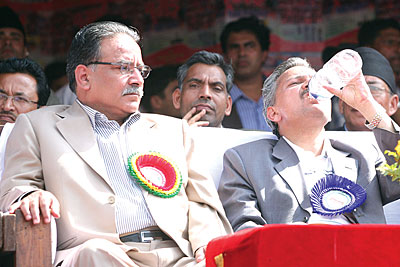 KIRAN PANDAY |
The historic necessity today, to repeat a cliché, is to write a constitution, which in turn requires movement on the cantonment issue. Neither of those processes can be divorced from government formation. The third round of voting will not serve any of these objectives.
The most probable scenario is that the stalemate will continue. Jhalanath Khanal will ensure the UML stays neutral for now. And the Madhesi parties will not support the NC without the UML on board, and even if they do, the numbers don't add up.
A Madhes-Maoist alliance is still unlikely. Upendra Yadav is tempted to go, but he has been locked into the broader front precisely to avoid this. Not all of his party members would agree either. The Maoists are trying to wean away a section of Bijay Gachchhadar's party, especially those who have not become ministers. Business associates and old royalist connections are being used to throw money around.
But even then, Pushpa Kamal Dahal will need to get at least 40-45 of the existing 82 Madhesi MPs to have a chance. That can happen if MJF backs Dahal and there is widespread cross-voting by Madhesi MPs lured in by the promise of financial rewards and lucrative ministries. It is also possible if Dahal strikes a deal with Delhi, which retains tremendous leverage over the TMDP and Sadbhavana, and over most MPs in the MJF(D) and MJF.
There are rumours that India may allow a short-lived Maoist-Madhes government and pull the plug in a few months. But Madhesi leaders and sources in Delhi and Kathmandu say that, barring a last-minute miracle, there is little chance of a deal with Dahal.
Let us assume that such a government is formed. How does it help? There will be a razor-thin majority; the NC and UML will remain out for now; and the bitter political and personal divisions will persist.
Even in the unlikely scenario that the UML joins such a government subsequently, can there be a deal on integration without the NC on board? Can there be a deal on constitutional issues between the UML and Madhesi parties?
If the third round does not elect a government, some have suggested that the speaker write to the president and ask for advice. Others say that the process can be amended to allow fresh nominations through an all-party decision and the house business advisory committee.
But Dahal and Poudel will both seek to block a change in the rules to give it another shot. This is where Bhattarai's efforts to generate pressure within the Maoists come in.
If Dahal loses again, it would dent his image considerably. Instead of recognising the objective situation, proposing Bhattarai's name while retaining power from behind the scenes, and coming across as a statesman, Dahal will be seen as having jumped into the game through deft manipulation, but failing in the process.
Bhattarai will not have it easy either. The chairman will seek a 'clarification' for his statements. Dahal will once again pick on the 'nationalism' rhetoric and allude to Bhattarai's 'Índian support'.
Party members will ask Bhattarai where the guarantee is that he will indeed be able to muster the support to form a consensus government.
Dahal would prefer to sit out in the opposition, or join another government as a junior partner, rather than see Bhattarai's potential elevation as PM - especially after his own losses.
Bhattarai himself knows that this is not the ideal time to vie for government leadership. Systemic constraints, and the wider pressures of a coalition, mean that the next PM will not be able to deliver. If Bhattarai does succeed, sections of his own party will seek to undermine him. But there is a real danger that the constitution may not be written, unless there is a broader political consensus, which Dahal has proved incapable of building.
Even as the transition becomes more complicated, there is a silver lining in recent developments. Madhav Nepal may have become PM through a parliamentary majority, but his legitimacy was always under question. The next government, whenever it is formed, will not suffer from the same conundrum. And there will be moral pressure on whichever party is in the opposition not to play spoiler.
READ ALSO:
In a state of deprivation, PUBLISHER'S NOTE
Women MPs seek to unlock deadlock, RUBEENA MAHATO
An open letter to the Big Guys, SUNIL B PANT



